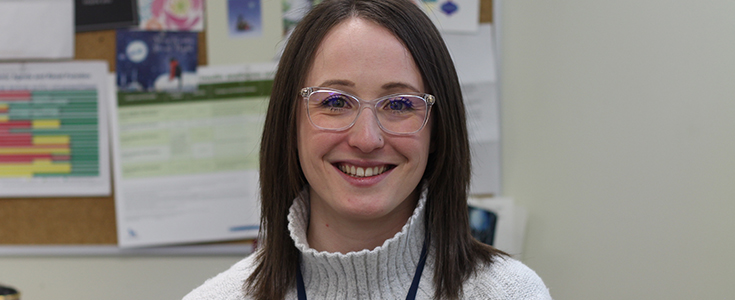Meeting them where they’re at
My Health Teams help connect patients with care
By Mike Daly
Health care is not a "one size fits all" endeavor. And so it shouldn't be a surprise that what works well in the suburbs isn't always suitable for those living in Winnipeg's less affluent neighbourhoods.
Hillary Mills knows that fact better than most. As a registered psychiatric nurse, she's spent her six-year career helping people in the downtown and Point Douglas neighbourhoods better connect to care - most recently as a chronic disease management clinician and certified diabetes educator for the My Health Team working out of 425 Elgin Avenue.
Launched in March, 2014, My Health Teams were designed to support the work of family physicians by freeing up some the time they devoted to their patient's follow-up care and/or social services needs. This allowed the physicians to see more patients and better meet demand for their services.
"My Health Teams were created to support busy family physicians by connecting their more complex patients with appropriate resources and by helping them navigate the health care system," Mills says.
The work of these teams is especially important in the downtown and Point Douglas neighbourhoods, where poverty, cultural and other socio-economic factors sometimes create unintended barriers to quality care.
"Many of the people we work with in Downtown/Point Douglas are marginalized or homeless individuals," Mills says. "We also support the new immigrant and refugee populations. Often, our clients have a number of chronic diseases and illnesses, sometimes coupled with mental health and addiction components."
These factors often require a different approach to care - one that recognizes the patients' unique circumstances and life challenges while building trust in a system that, historically speaking, has sometimes let them down.
"Sometimes there are trust issues," Mills admits, "and sometimes other barriers come into play. There might be barriers related to mental health, for example. If they are experiencing significant anxiety, they may have trouble leaving their home and attending appointments in order to access help. Often, there can be folks who have mobility difficulties, so physically getting to an appointment might be challenging. Transportation costs may be beyond their means. So we really try to be as low-barrier as possible."
That includes "meeting clients where they're at," Mills says.
"For our team, it's very important to meet the individual in their environment to start building relationships and some sort of rapport that helps get them better connected to the services and supports that are out there," she says.
Mills estimates that about 40-60 per cent of her time is spent in the community - meeting patients in their homes, or in other locations where they are more comfortable. The remainder of the time is spent in the office connecting with other community programs, doing follow-up work, and documentation.
Though Mills' primary focus is on diabetes education, she frequently collaborates with partnering programs such as Community Mental Health, Employment Income Assistance, housing authorities, Public Health, Home Care, and partnering clinics to help ensure her clients can access the supports they require.
"When clients are connected with the appropriate supports, we often see a significant improvement in their overall health, whether it be their mental health or their physical health," Mills says. "That leads to a reduction in the use of emergency and crisis services and an overall improved quality of life. If we don't work together and we don't collaborate, it's just going to make the job more challenging. "
Mills adds that with the will to collaborate firmly in place, members of the My Health Team and partnering programs are making headway.
"I love my job and the role that I'm in," she says. "I believe that in my three years, we've made progress in eliminating barriers that existed and in helping ensure that our clients are as supported as they can be in the community. I also believe we have a lot more work to do to connect with who perhaps have fallen under the radar and who may be slipping through the cracks in the system. Those are the folks we want to focus in on."
Mike Daly is a communications specialist with the Winnipeg Regional Health Authority.

